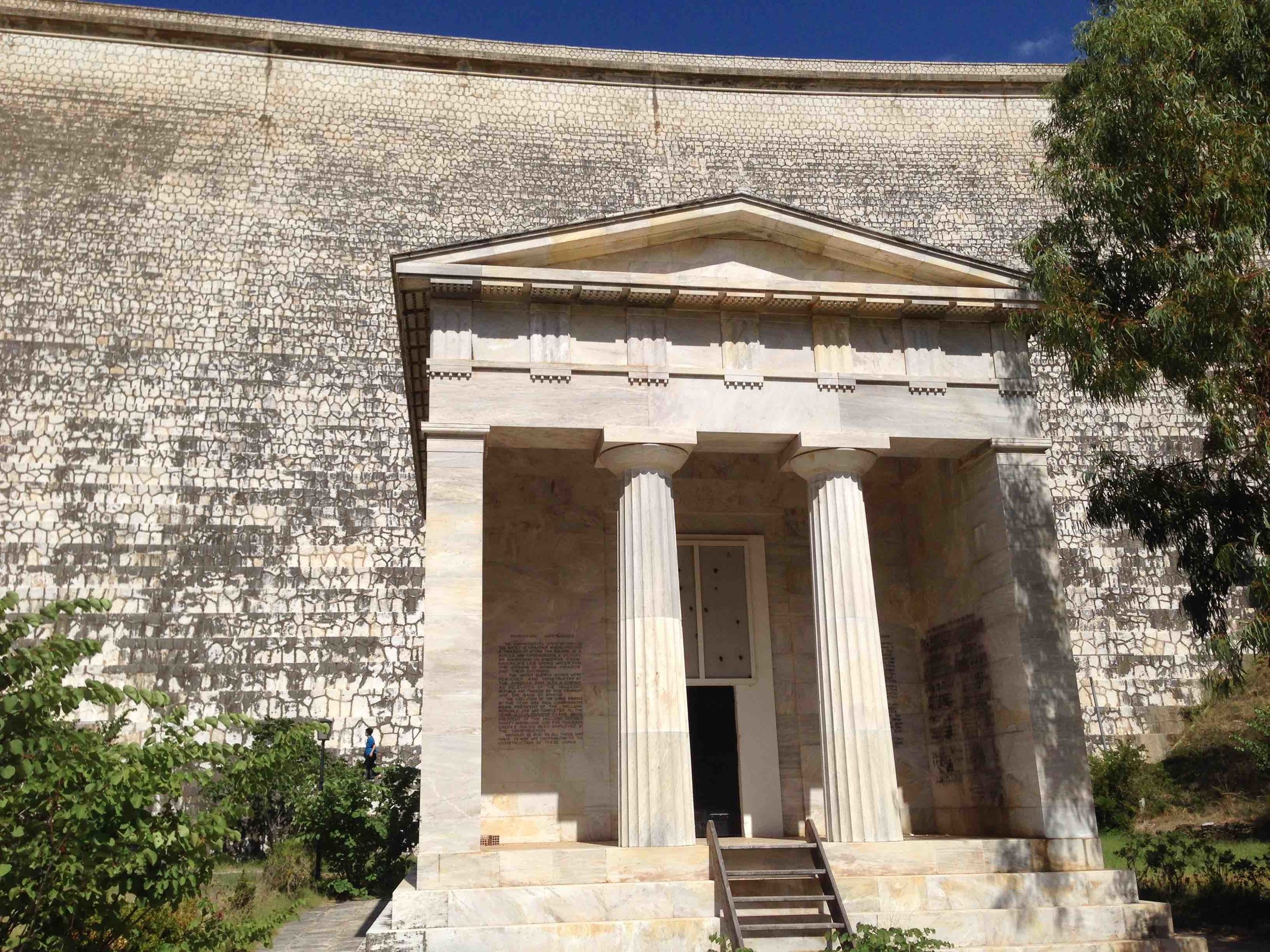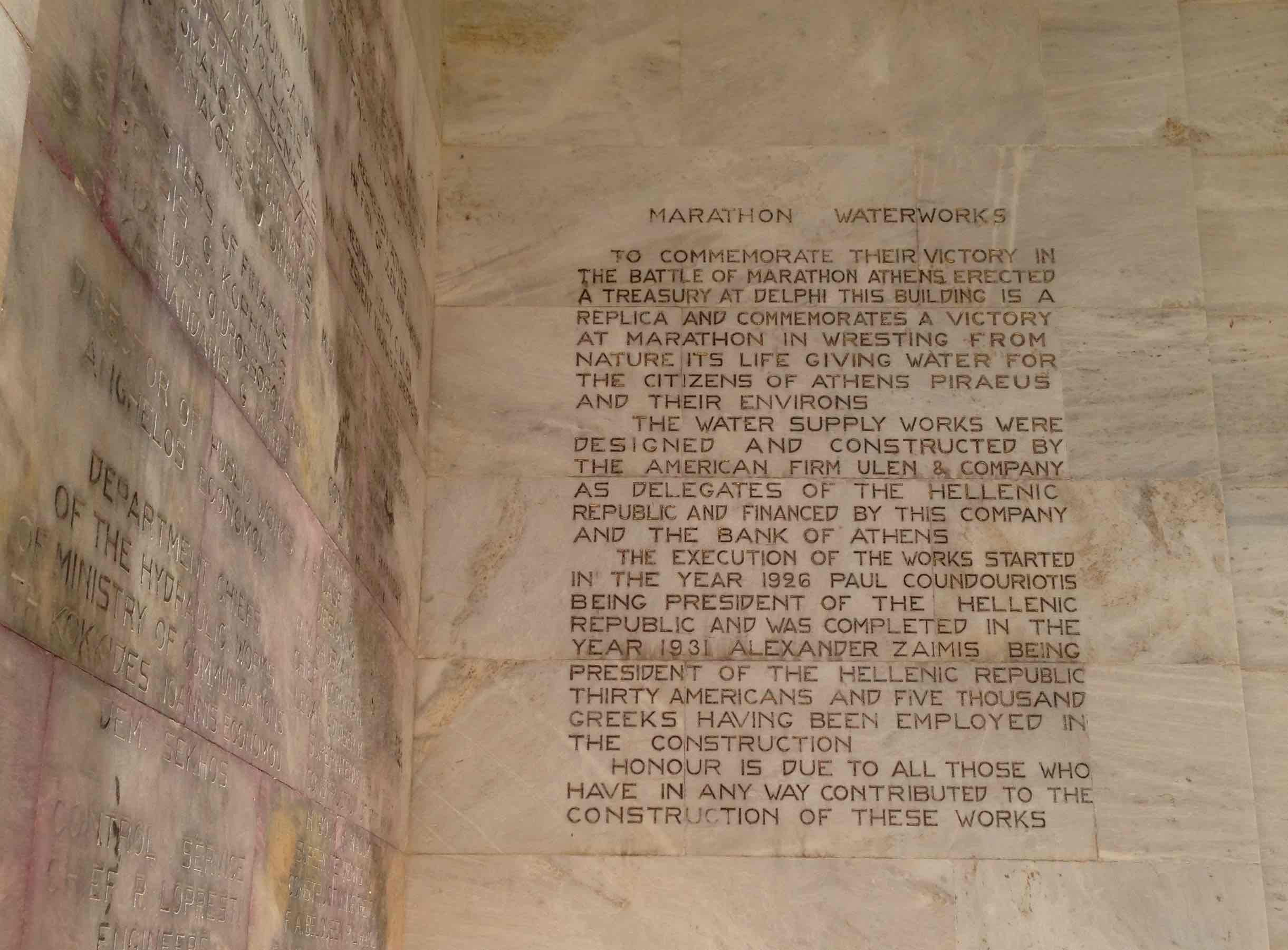“The People’s Water”
Within the parameters of resource management in the EM/MENA region is also the issue of Water Privatization
This project began through the kind invitation to Athens of the Employees Federation of the EYDAP Athens Water Company on multiple occasions to visit their offices, learn about their responsibilities and endeavors, and planned visits to the Marathon Dam and other important water sites in the city proper.
See images of this project within the Urban Foodshed at our Seoul Biennale NEWS page →
That which is opposed to the tyrant has the name “demos” (people) Thucydides, 460-394 B.C.
Water is a non-substitutable resource that makes life on this planet possible. Humans require water to grow food and for daily needs. For the functions of our modern culture to ensure societal growth – irrigation, industry, sanitation, maintaining ecosystems – access to water is also necessary. Throughout time, water has been not only fought for, it has also been controlled and regulated legally, militarily, politically, and economically. In the recent past, controlling water through market systems, and the commodification and privatization of water has endangered the accessibility, affordability, and quality of water for individuals, households, and communities around the world.
The justifiable ownership of water resources, water management services, and who should be the rightful and legitimate water provider of a nation or city as an ongoing global debate. The commons are defined as the cultural and natural resources accessible to all members of society, and all natural materials such as air, water, and a habitable earth. While the UN has declared the human right to have access to water and sanitation, the handling of water as a public good and not a commodity has not been enforced. Instead, for many decades, large companies have taken advantage of any opportunities offered by the political and economic instability around the world, to exploit the national water resources by buying and privatizing local water companies, and consequently, controlling global water supplies. The privatization of public water utilities and infrastructures, and exploitative water management schemes in the water sector have created a ‘water-market’ shaped and strengthened by political and corporate links and interests. The annual profits of private water companies account for 40% of the petroleum sector, they are higher than those of the pharmaceutical market, and in the future, they will surpass the market of energy, minerals and food.
The historical reservoir and dam of Marathon in the district of Attica, Greece, is under the jurisdiction of EYDAP Athens Water Company. The dam was built in 1929 along with its long supply tunnel, and became the main provider of water for the city of Athens. It has a maximum capacity of 41,000,000 m3.
Photo: Melina Nicolaides, 2016.
The case of Greek water is an example of an ongoing struggle to keep the “people’s water” in the hands of the public, following seven consecutive years of deep recession. It is also an example of the current effort of Greece to hold onto its last resource, as the drastic austerity measures imposed on the country to deal with its debt crisis has forced the government to sell off resources, state assets (ports, land, mines etc), public utilities, and most of its economically viable companies. This included pressure for the privatization of the public water utilities of both the city of Athens, (EYDAP) and also that of Thessaloniki (EYATH). What made this policy’s democratic legitimacy questionable was the fact the sale of Greece’s water was voted as unconstitutional in Greece’s highest court in 2014, while at the same time, the European Union guarantees the right of water to all its citizens. What made the economic merits of this policy questionable, is the fact that both water companies are profitable; and the reality that Athens water is among the highest quality water in all of Europe.
A banner placed by the syndicate of employees of EYDAP at the Dam site, “Water is NOT a commodity, it is a natural and common resource for all, IT IS NOT FOR SALE”, in protest to the threat of the privatization of the Athens municipal water supply. Photo: Melina Nicolaides, 2016.
The potential privatization of the water services of Greece’s two main cities could also be used as a vehicle to expand water private management to all of Greece. Other Greek municipalities are still served by local public networks, including water service to the Greek islands, which has the greatest money-making monopoly potential of all for a private company. In fact, a European company, France’s Suez Environnement, has been especially active among the candidates for privatizing water in Athens and Thessaloniki is who had first publicly proposed the privatization of the water services in 2009, even before the onset of the European debt crisis.
The possibility of the privatization of water services in Greece, first presented by the Greek government under pressure from Europe, raised strong opposition in both Athens and Thessaloniki, firstly from the water companies themselves. However, Greek citizen initiatives also had an impact on the anti-privatization storyline, especially that of the group SAVEGREEKWATER *. In the past years, the general public of Greece has shown great perseverance not only regarding national and local water awareness, but also in the fight to retain water as a public trust during all the years of excessive austerity measures that have been imposed on this country.
Throughout Europe, austerity-led changes to water supply have been fiercely resisted across Europe’s most indebted countries, also as a result of the re-municipalization trend that has already begun worldwide - as privately controlled water has been proven to be bad for water quality, service to communities, neglected infrastructures, price control and so forth. Even as hundreds of thousands of European citizens have openly rejected the privatization of water, it has nevertheless gaining momentum in many countries because of the sovereign debt crisis. In Spain, Portugal, and Italy, despite strong opposition from citizens and local politicians themselves, water privatization has come back on the agenda. According to the unions and activists who oppose water privatization, even as European officials ostensibly claimed neutrality as to the issue of public vs. private water management, they took advantage of the financial crisis in order to promote privatization as a solution to the budget troubles that European states and municipalities were facing.
The larger objective of this project was to emphasize one of the crucial challenges in our larger societal issues in the move towards a sustainable and more human-centered future: how water is valued and managed plays a role in understanding future cities and future societies. In a just society, water is always a cultural and natural resource, and a communal heritage that should be accessible to all members of society—a commons to be shared within a community.
More specifically for the nations of Europe, water awareness is a perspective through which to view the real-life and current concerns that European institutions face regarding future prospects, ethics and the direct-democracy rights of its half-a-billion citizens—many of which are currently raising questions surrounding the rightful and legitimate provider of water for the people. Through economic arguments we see the slow but steady de-democratization of Europe through EU and IMF austerity measures, being carried out with disregard of public opinion and the common good, a loss not only of financial sovereignty but of the very independence of some European nations and its own citizens. This questioning should serve to reveal the potential impact of today’s austerity-led economic pressures on national and municipal levels to take water supplies out of public hands in countries most severely affected by the European sovereign debt crisis, just as is occurring in other economically pressured cities throughout the world.
* SAVEGREEKWATER is a Greek citizens’ initiative that opposes corporate privatization of our water resources and its distribution. It was founded in July 2012 in an effort to inform the public opinion on the implications of allowing private corporations to commodify and profit from our limited water resources and to control this public good. The initiative has no funding, and it is an undertaking of people of different expertise and political grounds who believe in the democratic and rational management of this precious good for both private and agricultural use. Clean affordable water is a human right, and must remain a public commons.
For the Urban Foodshed primary source material project, “Drinking Water Chronicles”, special thanks go to the Athens Employees Federation for generously providing original material; and sincere thanks to Maria Kanellopoulou, founder of the Save Greek Water organization - all SGW images and tweets courtesy of Maria Kanellopoulou.





























